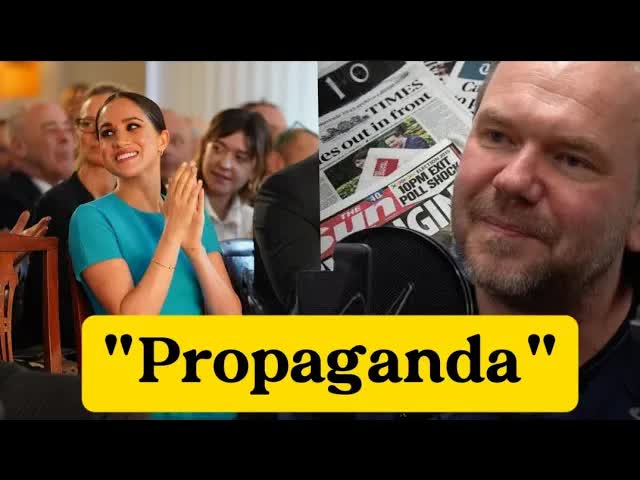The ongoing media frenzy surrounding Meghan Markle has sparked conversations about deeper societal issues, particularly the manipulation tactics employed by certain factions of the British press.
James O’Brien, a prominent radio host, has recently shed light on how the Duchess of Sussex has become a focal point for manufactured outrage, revealing troubling patterns of racial and gendered scrutiny that permeate contemporary media narratives.
O’Brien’s observations highlight a stark contrast in how different women in the public eye are treated, particularly within the realm of fashion commentary.
For instance, he pointed out the hypocrisy in praising one woman while simultaneously deriding another for similar interests.
This inconsistency reflects a broader malaise within the media landscape, where certain narratives are carefully crafted to incite division rather than foster understanding.
The notion that “boiled brains can be unboiled” resonates deeply in this context.
Many individuals seem resistant to confronting uncomfortable truths, preferring instead to cling to their biases.
As O’Brien suggests, some people may find comfort in hatred, using it as a shield against facing their own pain.
However, this approach ultimately leads to a life devoid of genuine fulfillment or connection.
At the heart of this issue lies a troubling pattern of right-wing media manipulation, particularly evident in the relentless targeting of Markle.
The media’s portrayal of her as a scapegoat serves to divert attention from broader societal anxieties about race, privilege, and the evolving dynamics of the British monarchy.
Instead of engaging in meaningful discourse, these narratives transform Markle into a mere symbol of cultural tensions, stripping away her humanity in the process.
Meghan Markle’s experiences within the royal family paint a vivid picture of systemic racism and institutional discrimination.
From the outset, she faced a toxic atmosphere where her mixed-race identity was consistently undermined.
The lack of support from senior royals during moments of intense media scrutiny further exemplifies the deep-rooted cultural issues at play, leaving her isolated and vulnerable.
The media’s treatment of Markle transcends traditional journalism, veering into the territory of character assassination.
Each aspect of her life is dissected with an intensity that far surpasses legitimate reporting, creating a narrative designed to undermine her credibility.
This disproportionate focus reveals a bias that prioritizes sensationalism over nuanced understanding, perpetuating harmful stereotypes and societal divisions.
The visceral animosity directed at Markle is a stark reminder of the intersection between misogyny, racism, and media sensationalism.
As a biracial American woman challenging the status quo, she has become a target for various forms of prejudice.
The media’s relentless campaign against her reflects not just a personal vendetta but a broader societal issue that demands critical examination.
The British royal family’s response—or lack thereof—to the media’s assault on Markle underscores a troubling complicity.
Their silence in the face of racist narratives signals an endorsement of the toxic environment that has sought to vilify her.
This strategic indifference not only fails to protect her but actively contributes to the ongoing campaign of cruelty against her.
The psychological toll of this relentless media barrage cannot be overstated.
Markle’s experience serves as a cautionary tale about the mental health challenges faced by public figures, especially women of color.
The invasive scrutiny she endures creates an insidious atmosphere that chips away at her emotional well-being, highlighting the urgent need for a reevaluation of media ethics and responsibilities.
Parallels between Markle’s treatment and that of Diana, Princess of Wales, reveal a systemic issue within the media landscape.
Both women have been subjected to a relentless cycle of public dissection, raising questions about the impact of such scrutiny on their mental health.
The tragic trajectory of Diana’s life serves as a haunting reminder of the potential consequences of unchecked media manipulation.
The targeting of Meghan Markle is symptomatic of a larger societal problem that extends beyond individual narratives.
Right-wing media platforms exploit existing biases to amplify divisive rhetoric, transforming discussions about race, gender, and privilege into inflammatory spectacles.
This manipulation not only marginalizes individuals but also perpetuates systemic discrimination, normalizing prejudice in the process.
Moving forward, the path to progress requires a commitment to inclusivity and genuine dialogue.
By recognizing and challenging the manipulative tactics employed by certain media outlets, we can advocate for a more empathetic public discourse.
Embracing diversity and dismantling structural biases are essential steps toward fostering understanding and healing in a society increasingly divided by manufactured outrage.
